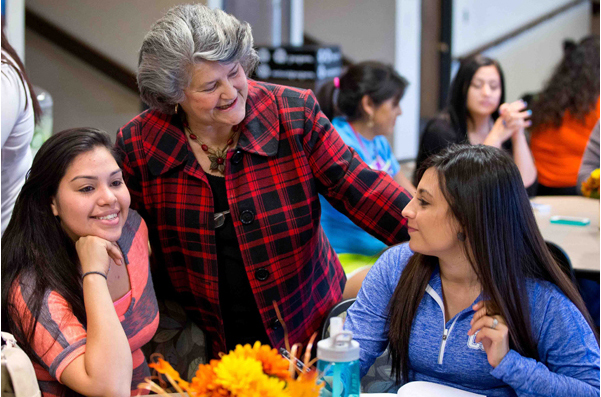
Kelly: Cuban exile Maria Luisa is moving away — but leaving Omaha a brighter place
By Michael Kelly | Omaha World-Herald columnist | October 17, 2014
A week ago Sunday at church, I exchanged a handshake of peace with a kindly woman next to me wearing a pink shirt.
We smiled and said hello but didn’t introduce ourselves. So I was surprised the next morning to pick up The World-Herald and see her photo on the front page — in the pink shirt.
Before Mass, she had walked in the Susan G. Komen fundraiser for breast cancer research, where everyone wore pink. The photo caption identified her merely as walk participant Maria Luisa Gaston.
But hers is a familiar name, especially in the Hispanic community of Omaha, where the pace of this Cuban exile’s life at times has been more a sprint than a leisurely walk.
“She’s very passionate and loves doing things for the community,” said Quetzalli Pliego, a paralegal for an immigration lawyer who also serves as a Boys Town crisis counselor. “She is very committed to helping youths.”
Gaston’s life story covers many facets, including:
- Fleeing Cuba at 15 with her parents and five sisters after the Castro regime nationalized her family’s sugar mill.
- Serving 15 years as a self-described “rebellious” nun before leaving her order.
- Working as executive director of the National Catholic Conference for Interracial Justice in Washington, D.C.
- Becoming the mother of a son, now 35, and grandmother to his four children.
- Surviving breast cancer.
- Moving to Omaha in 2000 to become program director of the Latina Resource Center.
- Recruiting Latina students since 2005 to the College of St. Mary.
With Latin music playing in the background, 2010 College of St. Mary graduate Pliego and other current and former students feted Gaston, 69, at a campus event Wednesday.
“She is like a grandma that everyone loves,” said senior Daniela Rojas, an art and theology major. “Maria Luisa came into my life at a moment when I imagined I would never go to college, and that the only thing I could do was go back to Colombia. But she called me and said she was able to get the (scholarship) money I needed.”
Maria Luisa, who soon will leave Omaha to care for her 91-year-old mother in North Lauderdale, Florida, is enjoying a kind of “farewell tour.” She was honored by college staff at a Thursday event and will be thanked at a community celebration from 2 to 6 p.m. Sunday at El Museo Latino, 4701 S. 25th St.
“She has contributed immensely to the community in many capacities of leadership,” said pediatric dentist Lourdes Secola. “Maria Luisa is a very genuine person, very warm. And she wears many hats.”
She has served on boards, helped run the College of St. Mary’s Latina Summer Academy for high school students and inspired many with her group Mujeres y Valores (“Women and Values”). She also plays guitar, sings, and writes poetry in English and Spanish.
Cuba is never far from her heart. A bumper sticker on her aging 1994 Toyota with 160,000 miles, which she is not taking to Florida, urges an end to the U.S. trade embargo with Cuba.
At her home this week near 52nd and Franklin Streets, with some boxes already packed, she said she thinks the embargo might be lifted. Although Cuba has a poor record on human rights, she said, the embargo mainly hurts the Cuban people.
Her own family, whose sugar mill dated to 1823, was living well when Fidel Castro’s 1959 revolution overthrew the government of corrupt leader Fulgencio Batista.
“Everybody was for the revolution in the beginning,” she recalled. “But that all changed. We lost everything.”
Her father, Melchor Gaston, had graduated from Villanova University near Philadelphia, and that’s the city to which the family fled. She finished high school at a private girls school there before entering a convent.
She majored in chemistry and philosophy and became a U.S. citizen in 1971. Her first return visit to Cuba came in 1998 — 38 years after the family left.
She knocked on the door of her old home, where a portrait of herself and her sisters still hung on a wall. The woman living there called out in Spanish to others: “It’s one of the girls in the painting. One of the girls is here!”
Maria Luisa since has made three other trips to Cuba, where the sugar mill is now dismantled. But after decades of “atheistic propaganda,” she said, Cuba is now secular. And the church of her childhood, which had been used as a movie theater, is restored.
The “miracle,” she said, is that for 40 years, people hid two stained-glass windows from the old church, moving them from house to house to prevent discovery by authorities. The windows have been reinstalled in the church, whose rebuilding was funded in part by “the exiled Gaston children” and other relatives.
Before she moved to Omaha, Maria Luisa knew little about the city except that it was the home of her youngest sister, Maria Teresa, who was director of Creighton University’s Center for Service and Justice and now is completing work on a Ph.D.
Maria Luisa has pushed for the higher education of young women and has helped bring greater diversity to the 1,034-student College of St. Mary. (Nearly 100 are Latina.)
“What she has really done for us is bring the attention of the Hispanic community to the College of St. Mary,” said the school’s president, Maryanne Stevens. “She knows how to respond to the families of prospective students, not just to students themselves.
“She just has a great heart and warmth for people and their needs. She is just wonderfully engaging and attentive.”
Maria Luisa explained that many children who came to the Omaha area with their parents in the 1990s are now of college age. When she started at the college in 2005, her analysis indicated that between 30 and 40 percent of Hispanic students graduating from Omaha-area high schools were undocumented immigrants.
She is proud to have obtained academic grants for 54 such students — and said that 53 of the families provided copies of their U.S. tax returns.
“Our immigration system is so convoluted and broken,” she said. “These are hardworking families with values. They exemplify what we believe our country is. We are all immigrants.”
Since Maria Luisa started at the college, work conditions have improved for some immigrant students brought to the U.S. illegally by their parents.
The Obama administration two years ago announced a change allowing such offspring to get a Social Security number to work and stay here without fear of deportation, at least temporarily. Nebraska and Arizona are the only two states that explicitly deny those young immigrants a driver’s license.
Pliego, the paralegal and crisis counselor who attended Wednesday’s event, said she moved across the river to Iowa so she could drive a car.
“Even if you have a work permit, you can’t get a driver’s license in Nebraska,” she said. “So I pay taxes in Council Bluffs, but I work in Omaha.”
Maria Luisa was cancer-free for many years but has fought off a spread of the disease in the past five years. Her condition, she said, is considered stable.
She is at peace with leaving Omaha in part because two College of St. Mary graduates are now in jobs she has held. Nadia Cruz is coordinator of the Latina Resource Center, and Patricia Saavedra is an admissions counselor at the college.
“Those are big shoes to fill,” said Saavedra, a native of Peru. “Maria Luisa is the reason I came here to school at CSM. I am who I am because of the leadership skills I learned here, thanks to her.”
Katty Petak, a native of Chile and College of St. Mary’s assistant dean of students, said Maria Luisa is dynamic and charismatic, and that students are drawn to her motherly ways.
“She has a lot of chispa,” Petak said. “That means ‘spark.’ All you have to do is ignite it and there she is.”
You never know who might be standing next to you in church on a Sunday morning. The woman who warmly extended a handshake of peace stood out in her pink shirt.
But she stands out for many other reasons — for her spark, and a lot more.







